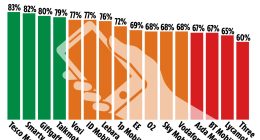

It is an invisible, deadly menace. It’s causing almost unfathomable economic destruction. We knew it was coming, but were caught woefully unprepared. It tricked nations into blaming one another—the US being the primary antagonist—instead of working together to stop it.
It is the novel coronavirus SARS-CoV-2, and it is climate change. The two are intimately linked: As you’d expect, emissions have fallen as people drive less and industries grind to a halt. But dig deeper into how the pandemic is influencing the climate, and surprising and often counterintuitive dynamics begin to emerge. This is your guide to those complexities.
Editor’s note: We’ll be updating this story as more research becomes available.
Yes, Emissions Are Falling. But Not for Long
Back in February, an analysis by the climate group Carbon Brief found that as the pandemic seized hold of China’s economy and heavy industries shuttered, emissions from the country plummeted by an incredible 25 percent. Another analysis by Carbon Brief in early April estimated that globally this year, emissions could fall by 5.5 percent from 2019 levels. That figure may seem low, given that fewer cars are on roads and industries have stalled, but with context, it’s stunning: Until now, emissions have been reliably increasing by a few percent year after year. That’s happening even though the world’s nations pledged to individually reduce their emissions as part of the Paris Agreement, with the ultimate goal of keeping warming below 2 degrees Celsius above pre-industrial global temperatures.
The 5.5 percent figure tops the 3 percent reduction in emissions that followed the 2008 financial crash, when economies also slowed and people traveled less. But emissions bounced right back as the economy recovered. Indeed, says Zeke Hausfather, the director of climate and energy at the Breakthrough Institute, which advocates for climate action, we can expect economies to roar back with fervor to make up for lost income. “Broadly speaking, the only real times we’ve seen large emission reductions globally in the past few decades is during major recessions,” Hausfather told WIRED in March. “But even then, the effects are often smaller than you think. It generally doesn’t lead to any sort of systematic change.”
Electricity Use in the US Has Declined Slightly, But Gasoline Sales Dropped Big Time
Anecdotally, we can say that Americans are driving far less, given all the empty freeways. And now Northern Arizona University climate scientist Kevin Gurney has the data to back it up: The amount of gasoline supplied in the US—a close measurement of direct consumption—fell by 50 percent over the two-week period ending April 3. “Not surprising, given what we all would expect to happen, but it’s just stunning to see it,” Gurney says. “I’ve never seen anything like it in my 25 years of looking at this data.”
Interestingly, the amount of diesel supplied has remained fairly stable. That’s probably due to it being more of a commercial fuel, used for the semi trucks that are still making deliveries while the rest of us keep our cars in the garage.
Electricity use across the country has declined a bit, but nowhere near as dramatically as with fuel supplies. “I think the speculation is a lot of the activity that uses electricity isn’t going down, it’s just shifting where it’s occurring,” Gurney adds. “So instead of commercial buildings being leaned on a little more heavily between 9 and 5, we’re at home using energy.”
This might offer a clue to why the emissions reductions worldwide are so much smaller than the 25 percent reduction scientists saw in China’s emissions earlier this year. It could depend on the structure of different nations’ economies. China is a major manufacturing center, which uses massive amounts of energy to keep production running. But the US and many other nations have offshored much of their manufacturing and transitioned into being service economies. When China’s workers go home, those emission-heavy industries close down. When workers in some other nations go home, they keep working, shifting the energy consumption from offices to houses.








